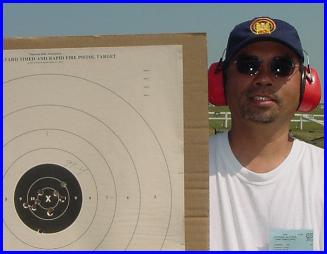
Greetings Shooters,
I certainly have no intentions of stirring up the ire of those who highly regard a certain respected shooting guide. However, I felt compelled to write about a possible danger to our eyes if carelessness is exhibited while following the advice given in the vision section of the U.S. Army Marksmanship Unit, Pistol Marksmanship Training Guide. Refer to Supplemental Information, Annex ll, "Optical Properties of the Eye Relevant To Sighting," C., 4.
The reader is advised to look near the sun while blinking to improve (decrease) sensitivity to light (photophobia). The guide recommends glancing closer and closer to the sun as the exercise continues. I know of no active eyecare practitioner who recommends this potentially dangerous procedure and this advice was probably not from a doctor.
Readers are warned of possible damage to the eyes, but there are too many chances to cause permanent retinal damage. Although it states that one should not look directly at the sun, a retinal hole can easily develop adjacent to fovea which is our central focal spot in the retina. The fovea along with the macula, which is the area immediately surrounding the fovea, process all the central visual information as we focus onto objects.
The guide does not quantify what sun intensity is considered safe, how long to stare next to the sun, the frequency of blink, nor how close to the sun to stare. It further states that vision will be strengthened and improved as one continues with this exercise. I have no concept as to what this statement means. During the recent Zins/Moody clinic in California, I was informed that this technique has never been taught to the Marine shooters.
Use your best judgment when your eyes are involved. I've examined patients with permanently damaged retinas who have looked towards the sun deliberately, typically during an eclipse. This has happened to a local law enforcement officer/patient of mine.
There is no safe way of looking towards the sun, even for those who are forewarned of the possible danger and who try their best to be careful. The guide states, "The eye is admirably equipped to protect itself......," but yet eye specialists continue to examine patients with damaged retinas due to the sun. Permanent damage to the eyes may be a career ending problem, which should and could be avoided. That's why sunglasses are available. Other possible related eye conditions due to the harmful effects of the sun may include cataracts, macular degeneration and may aggravate pterygium growth. For your (shooting) eyeglasses, consider using polycarbonate lens material, Transitions tint, or UV coating to block ultraviolet. Shoot well while shooting safely.
Good Vision and Good Shooting to All,
Norman H. Wong, O.D.
